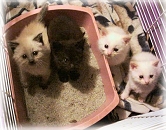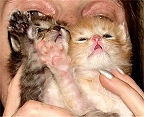Cats don't need to be trained to use a litter box - they just do it.
 |
By understanding why they prefer to eliminate in a litter box will help their human owners not to make any mistakes in having and maintaining the "cat box". It is a cat's basic instinct (even big cats) to eliminate away from their food and sleeping area and to bury the waste in order to hide their position from other animals and protect their nests and young.
Most kittens start using the litter-box at the age of 3-4 weeks on their own. At this young age you can show the kitten where to go and it might happen a bit faster: |
- Immediately after feeding your kitten, pick her up and gently place her in the litterbox. Scratch the litter a little with your fingers so she can get the idea.
If she goes, praise her profusely. If she doesn't, watch her closely for indications of wanting to go elsewhere.
The instant you see her squatting, pick her up and gently place her in the litter-box.
- The learning curve for kittens to begin using the litter box can be a little longer if you live on a boat. Some downeast yachts have nice outside cockpits that are perfect for having a litter box where the smell won’t bother anyone. Many marinas are often pet friendly too making it enjoyable to travel with your cat.
- Never throw her in or scold her--it will only associate the box with unpleasant memories in her mind.
Every time she uses the box, praise her profusely. You want her to associate her box usage with pleasure.
- Keep the box immaculately clean, by scooping it several times a day and changing the litter and washing and disinfecting the box at least twice weekly.
Here are a few things to consider about the litter box:
- Don't place a litter box close to food or water.
- Some cats do not like covered litter boxes. Not only does the odor tend to stay within the box if it is not kept scrupulously clean but large cats are often not able to achieve a comfortable position for elimination.
- Being meticulous creatures, cats are reluctant to stand on/in half wet or soaking wet litter. If you are unable to clean the box often enough consider getting another box.
- The litter box should only have about a half inch of inch of litter and it should be changed frequently. Cats and especially kittens do not like sinking into a soggy mound of smelly litter. Putting a small amount of litter into the pan saves litter and also means it is easier for you to change.
- Don't line the bottom of the litter pan with newspaper or use plastic liners. Newspaper smells and those plastic liners form wrinkles for urine and feces to hide. The plastic liners also tear easily.
- If your cat soils a hard surface, it might be a sign that he prefers that type of surface. You might try putting litter on only half the bottom of the litter pan. You should never change brands of litter once you find one that is well liked.
- Clumping litter should be avoided especially with kittens. This type of litter creates more dust, which settles on the kitten, is ingested when the kitten washes itself and then clump inside the kitten's stomach.
- Longhaired cats and declawed cats are especially sensitive to unclean, deep and smelly litter. A declawed cat' paws are more sensitive to litter in general. Please read our stand on declawing.
- Do not use harsh or odiferous sprays around the litter box. Cats frequently shy away from chemicals designed to mask odors. Masking bad odors with pleasant ones may be pleasant to you but not to your cat.
- Lack of privacy can also cause problems. Interruption by children and sometimes other pets, such as a dog and loud household noises must be avoided. A quiet location for the litter box is a necessity.
- Urinating outside the litter box is frequently the first sign of a bladder or kidney problem and if the problem persists the cat should be checked out by your veterinarian.
|


